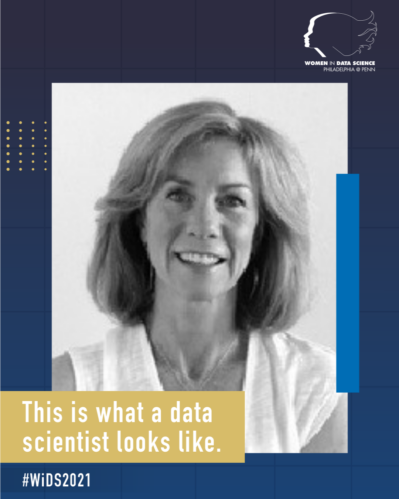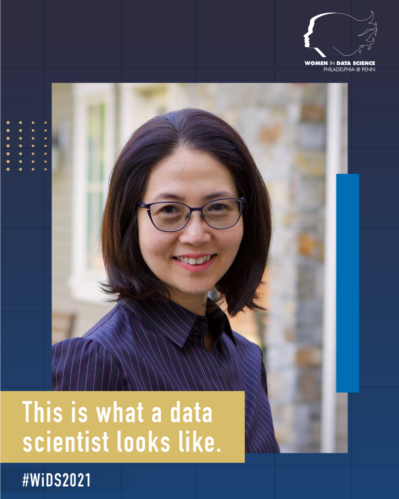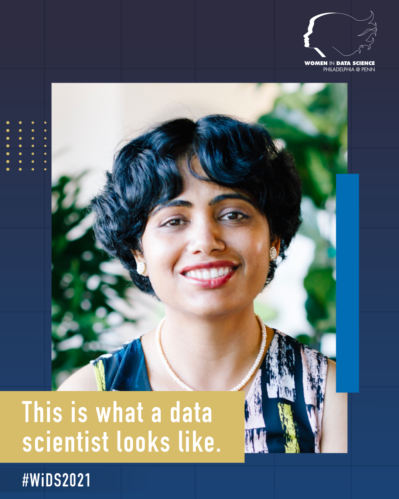Women in Data Science @ Penn Conference
Building a Career in Data Science: Lessons from the Journeys of Three Leaders
Demand for data scientists is exploding. At such a time, what can women do to build successful careers in this fast-growing field? A panel of industry experts, moderated by Mary Purk, Executive Director of AI and Analytics for Business and AIB for Business, discussed this issue at the recent Women in Data Science @ Penn conference. Their recommendations: move outside your comfort zone; find great mentors; keep learning; and Network, Network, Network.
In 2001, at the tail end of the dot-com boom, Barkha Saxena began her career in data science. A graduate of the Indian Institute of Technology, Saxena entered the workforce as a software engineer and quickly discovered a passion for working with data. Seeking more opportunities in the field, Saxena moved to the U.S. and landed a job at FICO (originally Fair, Isaac and Company), a data analytics company in San Jose, California, where she climbed the leadership ladder. From there, she went on to pursue various roles in data science product development, sales, and strategy. In these roles, she learned to convince people about the value of data solutions and how data creates value for the organization. “The learning I gained during that period has been instrumental in all the things I have done since then,” she says.
Now the Chief Data Officer at Poshmark, a leading social marketplace for new and secondhand style, Saxena shared these insights from her career journey at the recent Women in Data Science @ Penn conference. As part of an industry panel, sponsored by Wharton Women in Business, she offered advice to women who want to pursue careers in data science. Other panelists included Christine Cox, VP of Data and Analytics for IKEA Digital, IKEA Group, and Didi Huang, Director of Data Science (Business Opportunities) at Facebook.
This is How a Data Science/Analytics Leader Acts
- Knows the value of their data
- Knows how data creates value
- Speaks up and stands up
- Is authentic
- Is consistent and persistent
- Creates a culture of innovation and incubation
- Is open to new learning all the time
- Partners with top academic talent to conduct research
“In the end, people make an impact on your career, not the company.”
– Barkha Saxena, Chief Data Officer at Poshmark
Mary Purk, Executive Director of Wharton AI & Analytics for Business, moderated the discussion. She asked the panelists to offer advice to women who want to pursue careers in data science. In response, Saxena suggested that it was important to “speak up and stand up. We as women are generally not good at it,” she noted. “Speak your mind and ask for what you want – whether it is a new role, a salary increase, a team you want to work in, or a new challenge. If you want to take on a new challenge, go for it. Don’t hesitate.”
Saxena highlighted the value of building relationships with mentors. “When you are looking for your next job, think about the team you will be working with and who your mentor will be. That person will be your champion in making sure you get strategic opportunities and guide you on your career direction. In the end, people make an impact on your career, not the company.” Saxena added that it is important to be authentic. “Be yourself,” she said. “That is the only way you will be able to keep doing what you are doing.”
 A Winding Path, Not a Ladder
A Winding Path, Not a Ladder
At IKEA, the global furniture retailer, Christine Cox and her team are helping the organization move from a descriptive to a predictive data culture. Her career journey has been “more like a winding path than a ladder,” she said. Armed with an undergrad degree in English, Cox initially faced many questions about whether she might pursue law or journalism. Being unsure about what she wanted to do, Cox started out in consulting at Accenture. “I learned how to code in C++ and was part of a 400-strong team that was coding on a mainframe and creating an order-shipping tracking program,” she noted. After getting an MBA from Wharton, Cox joined Goldman Sachs and then American Express, where she learned about customer data and consumer behavior. These jobs taught her “how consumers like to spend money, where they travel, what they like to do, and most importantly, how we could predict what their next move would be.”
In these roles, Cox was reintroduced to technology and data analytics from a digital perspective. She became “passionate about consumer behavior, creating a better consumer experience, and being able to predict and make decisions based on data.” She later moved to IKEA as the country manager of digital data and analytics within the U.S. digital hub. “My team uses data science and analytics to build an end-to-end platform that we use to make data-based decisions and build a better IKEA.com experience for our customers,” she noted.
“Take a risk, stretch yourself, try something new. It’s when you stretch yourself that you grow the most.”
– Christine Cox, VP of Data and Analytics for IKEA Digital
Cox had three pieces of advice for women who want to build careers in data science. First, she noted, “It is a marathon and not a sprint. Being consistent and persistent throughout your career is key to success.” Second, she encouraged taking career risks. “Be open to a new challenge. Take risks, but don’t wait too long. In general, women tend to be less confident than men in the workforce. Take a risk, stretch yourself, try something new. It’s when you stretch yourself that you grow the most.”
Cox explained how she ventured beyond her own comfort zone when, after 15 years in operations roles, she joined Prophet Consulting as a partner. “I was suddenly thrown into a role where I was expected to bring in new clients, build a data product offering, and I was expected to travel a lot, which I had never done. I took a risk, tried something new, and I grew tremendously over a two-year period.”
Third, Cox emphasized the value of networking. “Be thoughtful and proactive rather than doing it in fits and starts,” she said. “Schedule regular coffees at work with people in your organization. When you schedule those meetings, have an agenda. Also, think about how you can create a group outside your office.” Cox created a women’s networking group in the Philadelphia area that would meet once a month to “see how everyone was doing, share learning, see how careers were going,” she noted. “We started to think about how we could tap into each other’s skills and expertise. This has really helped. It has led to introductions for companies for which I have been grateful.”
This is How to Become a Data Science/Analytics Leader
- Network, especially with people who are ahead of the curve
- Move outside your comfort zone
- Find great mentors
- Speak your mind and ask for what you want
- Don’t hesitate, take risks, and take on new challenges
- Build relationships with mentors/champions
- Take the winding path, not the ladder
- Establish a point of view while operating in ambiguity
Building a Career Like a Brand
Didi Huang leads the data science and quantitative research teams within the global consumer marketing group at Facebook. She did not start out as a data scientist or analyst. “When I graduated from college in the mid-1990s, data science did not even exist as a career,” she noted. “The Internet was still in its infancy. So how did I pick up the knowledge, mindset, and skills needed to excel in data science?” Tracing her journey, Huang explained that in 1995 she graduated from the University of Melbourne, Australia, with a bachelor’s degree in electrical and electronics engineering. “My final thesis was on neural network optimization with computer science as my favorite subject,” she said. “When I graduated, I realized that working as an engineer was not the only option for me.”
Huang explored other industries and non-traditional career paths. She ended up in the reinsurance industry as an engineering risk underwriter in Switzerland. In that role, she had to analyze risk for engineering companies or projects. “I determined policy terms and calculated premiums based on actuarial and background information,” Huang said. “There I ventured into the world of finance, looking at alternate ways of assessing risk.”
Realizing that she did not know enough about how financial markets worked, Huang returned to graduate studies and got her MBA at Wharton, majoring in finance. “Looking back, that was one of the most extraordinary experiences of my life,” she said. “It was eye opening, mind blowing. We had a cohort of students from all over the world, and world-class professors who challenged my thinking all the time. I would not trade it for the world.”
Huang went into business consulting after graduation. “From then on, my career became about solving business problems by using data insights and storytelling,” she said. “While working as a consultant I learned how to come up with a point of view while operating in ambiguity. I also understood that data visualization matters a lot. After consulting, I spent 13 years at eBay, where I built and grew numerous analytics teams. I picked up coding again and grew my skill in handling data from gigabytes to terabytes and then to petabytes.”
While Huang worked hard to maintain her technical skills, there came a time when managing teams became her primary responsibility. “I decided to invest more time in coaching and enabling others by applying what I knew,” she said. “While general management and leadership skills have become more important over time, my years of experience in data science have helped me understand what is required to be successful. It helped me identify, hire, retain, motivate, and develop top talent. At Facebook, I lead a team of global data scientists to develop product strategy through data science and experimentation. It requires constant collaboration, aligning perspectives, storytelling, methodology discussions, and excellent execution, while constantly pushing to make every team better.”
“With passion, everything follows and becomes easier. So, find something you love doing, and integrate that with something you care about.”
– Didi Huang, Director of Data Science (Business Opportunities) at Facebook
Summing up her experience, Huang noted that her career in data science has been driven by her “passion in solving business problems using data and science. With passion, everything follows and becomes easier. So, find something you love doing, and integrate that with something you care about,” she said. “Another piece of career advice I give to women is always raise your hand to take on new challenges, even if you do not think you are quite ready. Growth comes from stretching yourself, not from continuing what you are already comfortable doing.”
Huang ended with a piece of advice that she often shares with people she mentors. “Building your career is like building your brand that can stand the test of time,” she said. “It is not about the big moments like getting a promotion, receiving an award, or getting a bigger team to re-org. It is about how people experience you every day. If you consistently help others be better at what they do, you will earn a seat at the table. These people may be your peers, business partners, stakeholders, managers, or subordinates. You will get a lot of career sponsors who will want you to join them in their next big endeavor. You will have the opportunity to pick up bigger and harder problems, along with achieving success.”
 Choosing Mentors
Choosing Mentors
Purk requested Saxena to describe how she chooses mentors in the male-dominated field of data science. Saxena noted that mentors can be peers or seniors. “They can be a diverse set of people,” she said. “What is common across all of them, when I think back, is that I should be able to connect with that person and trust that person to be super honest. I should be able to share my weaknesses, my fears, what I am trying to do, and what is stopping me from getting there. They are people who get you over the hump. They help you tackle that next challenge. You need to be able to have an enriching conversation. My relationships with my mentors were such that I could speak with them about my professional life as well as my personal life.”
Saxena noted that she gravitated towards mentors with high EQ [emotional intelligence quotient] and IQ. “I emphasize EQ because that is critical. In my professional life, the person must have influence. By influence, I do not mean the person must have a big title. There are many ways for people to have influence. It is because I am looking for advice on the next thing that I am trying to do…That person must know more than I do so that I can learn from them.”
Networking in Large Organizations
In addition to mentorship, networking is a valuable career skill. Purk asked Cox, “How would you recommend networking within large organizations?” Cox noted that she thinks about networking in two ways. “First, conferences like [Women in Data Science @ Penn] offer an opportunity to network with people from whom you are trying to learn more,” she said. “The good news is that even during COVID, we have found ways to connect [online].”
Cox’s second suggestion was to create a culture of innovation and incubation. “It helps to network with people who are ahead of the curve,” she said. “At IKEA, we are creating a culture of data science that goes from descriptive to predictive and prescriptive. We are always looking for new voices and people to share learnings with and partnerships we can tap into.”
Keep Learning
Purk asked Huang how she challenges herself to keep learning about the latest research and technologies. Huang’s response: “I have never thought about keeping up with research and the latest technologies as a personal goal. My goal has always been to have a positive impact in business. Keeping track of research or new technologies is a means to that end.” Huang noted that she tries to hire “people who are smarter than me, who are thought leaders in their fields. This gives me opportunities to learn from them. For example, when I needed to understand how to improve brand perception, I brought in demographic and survey science experts to help. I learned a lot about the latest quantitative approaches. In addition, I partner with top academic talent to conduct research and help us solve hard problems.”
Huang agreed with Cox that networking has immense value. She often leverages her network of analytics experts to keep up with new ideas and trends. “Once we were able to work with venture capital firms to organize a meeting with startups that are in the measurement field, and we got to learn about the tools they are creating,” she said. “I rely on two personal traits to continuously learn: Desire to make an impact and a growth mindset. That is extremely important. You must keep yourself open to new learning all the time.”
About WiDS @ Penn Conference
Women in Data Science (WiDS) @ Penn is an independent virtual event presented by the University of Pennsylvania to coincide with the annual Global WiDS Conference held at Stanford University and an estimated 150+ organizations worldwide. All genders are invited to attend WiDS regional events, which features outstanding women doing outstanding work. This year’s theme for WiDS Philadelphia @ Penn was: This is What a Data Scientist Looks Like.


